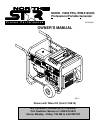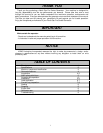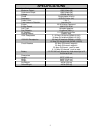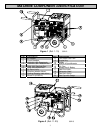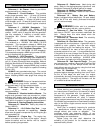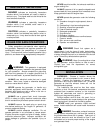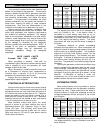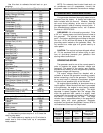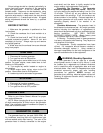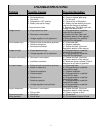
7
Use this chart to estimate the total load on your
generator.
For Determining Generator Load Requirements
Dev ice Running Watts
Air Conditioner (12,000 Btu) 1700 (a)
Battery Charger (20 Amp) 500
Belt Sander (3”) 1000
Chain Saw 1200
Circular Saw (6-1/2”) 900
Coffee Maker 1000
Compressor (1 HP) 2000 (a)
Compressor (3/4 HP) 1800 (a)
Compressor (1/2 HP) 1400 (a)
Curling Iron 700
Dishwasher 1200
Edge Trimmer 500
Electric Nail Gun 1200
Electric Range (one element) 1500
Electric Skillet 1250
Furnace Fan (1/3 HP) 1200 (a)
Freezer 800 (b)
Hair Dryer 1200
Hand Drill (1”) 1100
Hand Drill (1/2”) 875
Hand Drill (3/8”) 500
Hand Drill (1/4”) 250
Hedge Trimmer 450
Home Computer 150
Impact Wrench 500
Jet Pump 800
Lawn Mower 1200
Light Bulb 100
Microwave Oven 700
Milk Cooler 1100 (a)
Oil Burner on Furnace 300
Oil Fired Space Htr (140,000 Btu) 400
Oil Fired Space Htr (85,000 Btu) 225
Oil Fired Space Htr (30,000 Btu) 150
Oven 4500
Paint Sprayer, Airless (1/3 HP) 600 (a)
Paint Sprayer, Airless (handheld) 150
Radio 200
Refrigerator 600 (b)
Slow Cooker 200
Submersible Pump (1-1/2 HP) 2800 (a)
Submersible Pump (1 HP) 2000 (a)
Submersible Pump (1/2 HP) 1500 (a)
Table Saw (10”) 2000 (a)
Television 500
Toaster 1000
Vacuum cleaner 250
VCR 70
Water Heater 3000
Weed Trimmer 500
(a) Hard-starting motors require 3 to 5 times the
rated running watts.
(b) These loads may require up to 15 minutes to
restart due to their normal build up of compressor
head pressure.
NOTE: For extremely hard to start loads such as
air conditioners and air compressors, consult the
equipment dealer to determine the maximum wattage.
PRE-START PREPARATIONS
Your generator has been thoroughly tested prior to
shipment from the factory. A factory test report has
been included with this manual. However, damage
can occur during shipping, so be sure to check for
damaged parts or loose or missing nuts and bolts. If
the aforementioned problems occur, call Customer
Service at 1-800-270-0810.
GROUNDING - All units must be grounded. Drive
a 3/4” or 1” copper pipe or rod into the ground close to
the generator. The pipe/rod must penetrate moist
earth. Connect an approved ground clamp to the pipe.
Run a no. 12 Ga. wire from the clamp to the generator
grounding screw located on the generator head. Do
not connect to a water pipe or a ground used by a
radio system.
CAUTION: The engine has been shipped without
oil. Fill the crankcase with oil before trying to start.
Low oil shut-down prevents your generator from
starting without sufficient oil.
OPERATING SPEED
The generator must be run at the correct speed in
order to produce the proper electrical voltage and
frequency. The speed of the engine was carefully
adjusted at the factory so that the generator produces
the proper voltage and frequency.
The output voltage should be checked with a
voltmeter to ensure the generator is working properly
before connecting a load to the generator. Failure to
do so could result in damage to equipment plugged
into the unit and possible injury to the individual.
All engines have a tendency to slow down when a
load is applied. When the electrical load is connected
to the generator, the engine is more heavily loaded,
and as a result the speed drops slightly. This slight
decrease in speed, together with the voltage drop
within the generator itself, results in a slightly lower
voltage when the generator is loaded to its full capacity
than when it is running with no load. The slight
variation has no appreciable effect in the operation of
motors, lights and most appliances. Electronic
equipment and clocks will be affected if correct RPM is
not maintained. See Load vs. Output chart.
Load Output
Percent of
Generator
Output
Speed
(RPM)
Frequency
(Hz)
Generator
Voltage at 120V
Receptacle
0 % 3750 62.5 120
50 % 3660 61.0 120
100 % 3600 60.0 120



